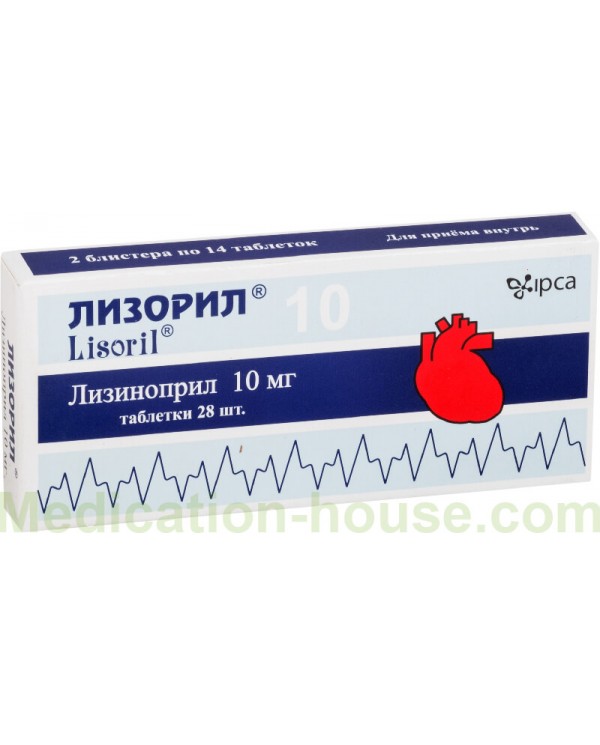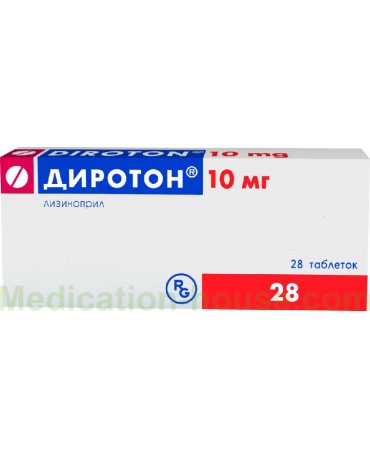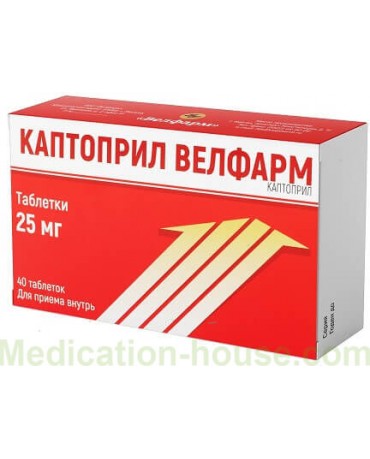Instruction for Lisoril
Reed more and buy Lisoril here
Composition
Each 5 mg tablet contains:
Active ingredient: lisinopril dihydrate 5.45 mg is equivalent to anhydrous lisinopril 5.00 mg
Excipients: corn starch 26.25 mg, mannitol 18.00 mg, calcium hydrogen phosphate dihydrate 54.00 mg, magnesium stearate 1.05 mg, iron dye red oxide 0.105 mg.
Each 10 mg tablet contains:
Active ingredient: lisinopril dihydrate 10.89 mg equivalent to anhydrous lisinopril 10.00 mg
Excipients: corn starch 52.50 mg, mannitol 36.00 mg, calcium hydrogen phosphate dihydrate 108.00 mg, magnesium stearate 2.10 mg, iron dye red oxide 0.210 mg.
Each 20 mg tablet contains:
Active ingredient: lisinopril dihydrate 21.78 mg equivalent to anhydrous lisinopril 20.00 mg
Excipients: corn starch 52.50 mg, mannitol 36.00 mg, calcium hydrogen phosphate dihydrate 108.00 mg, magnesium stearate 2.10 mg, iron dye red oxide 1.15 mg.
Pharmacodynamics
Suppresses the formation of angiotensin II from angiotensin I. Reduces the content of angiotensin II leads to a direct decrease in the release of aldosierone. Reduces the degradation of bradykinin and increases prostaglandin synthesis. Reduces the total peripheral vascular resistance, blood pressure (BP), preload, pulmonary capillary pressure, causes an increase in cardiac output and an increase in myocardial tolerance to stress in patients with heart failure. Expands arteries more than veins. Some of the effects are attributed to the effect on tissue retin-angiotensin systems. With prolonged use, the hypertrophy of the myocardium and the walls of the resistive arteries decreases. Improves blood supply to the ischemic myocardium. ACE inhibitors prolong life expectancy in patients with heart failure, slow down the progression of left ventricular dysfunction in patients who have had myocardial infarction without clinical manifestations of heart failure. The onset of action is after 1 hour. The maximum effect is determined after 6-7 hours, the duration is 24 hours. With arterial hypertension, the effect is noted in the first days after the start of treatment, a stable effect develops after 1-2 months.
Pharmacokinetics
Bioavailability of the drug is 25-50%, weakly binds to blood plasma proteins. The maximum serum concentration is reached after 7 hours. Food intake has no effect on absorption. Lisinopril is not metabolized and is excreted unchanged in the urine. Most of it is released during the initial phase (effective half-life of 12 hours), followed by a terminal distant phase (half-life of about 30 hours). Permeability through the blood-brain barrier and placental barrier is low.
Indications
- Arterial hypertension (as monotherapy or in combination with other antihypertensive drugs);
- chronic heart failure (as part of combination therapy for the treatment of patients taking digitalis drugs and / or diuretics).
Contraindications
- Hypersensitivity to lisinopril and other ACE inhibitors,
- severe renal dysfunction,
- bilateral stenosis of the renal arteries or stenosis of an artery of a solitary kidney with progressive azotemia, condition after kidney transplantation, azotemia,
- primary hyperaldosteronism,
- aortic stenosis (and similar obstruction to blood flow),
- hereditary angioedema,
- pregnancy,
- lactation period,
- age up to 18 years (efficacy and safety have not been established).
Carefully
- Arterial hypotension,
- oppression of bone marrow hematopoiesis,
- hyponatremia (increased risk of arterial hypotension in patients on a low-salt or salt-free diet),
- systemic diseases of the connective tissue,
- diabetes,
- gout,
- hyperuricemia,
- coronary heart disease,
- cerebrovascular insufficiency,
- severe chronic heart failure,
- hyperkalemia,
- elderly age.
Method of administration and dosage
Take orally before, during or after meals.
Arterial hypertension
The initial dose of Lisoril is 5 mg once a day. The dose changes in accordance with the change in blood pressure. The usual dose is 10 mg per day in a single dose. If there is no adequate response, the dose can be increased to 20-40 mg per day. The maximum daily dose is 80 mg.
For patients taking diuretics, the dose is selected individually.
In case of impaired renal function: the dose is set depending on the values of creatinine clearance (CC). When CC is more than 30 ml / min, the recommended initial dose of Lisoril is 5-10 mg per day. With QC from 30 to 10 ml / min, the initial dose is 2.5-5 mg per day. With CC less than 10 ml / min - 2.5 mg.
Chronic heart failure
An initial dose of 2.5 mg per day is recommended. This dose is effective in some patients, but is more commonly achieved in doses of 5-20 mg per day.
Side effects
From the side of the cardiovascular system: lowering blood pressure, chest pain, rarely - orthostatic hypotension, tachycardia, bradycardia, the appearance of symptoms of heart failure, impaired atrioventricular conduction.
From the nervous system: dizziness, headache, fatigue, drowsiness, convulsive twitching of the muscles of the limbs and lips, rarely - asthenic syndrome, mood lability, confusion.
From the gastrointestinal tract: nausea, dyspepsia, anorexia, taste changes, abdominal pain, diarrhea, dry mouth.
From the side of hematopoiesis: leukopenia, thrombocytopenia, neutropenia, agranulocytosis, anemia (decreased hemoglobin content, erythrocytopenia).
From the respiratory system: dyspnea, bronchospasm, apnea.
Allergic reactions: angeoneurotic edema, skin rashes, itching.
Laboratory indicators: hyperkalemia, hyperuricemia, rarely - increased activity of "hepatic" transaminases, hyperbilibinemia.
Others: dry cough, decreased potency, rarely - acute renal failure, arthralgia, myalgia, fever, edema (tongue, lips, extremities), impaired fetal kidney development.
Interaction: There was no significant interaction of Lisinopril with propranalol, hydrochlorothiazide, digoxin. It is possible to reduce the hypotensive effect of Lisinopril while taking it with nonsteroidal anti-inflammatory drugs, estrogens, sympathomimetics. Hydrochlorothiazide can potentiate the antihypertensive effect of Lisonopril. Combined use with beta-blockers, blockers of "slow" calcium channels and diuretics increases the hypotensive effect of Lisinopril. With simultaneous use with potassium-sparing diuretics (spironolactone, triaterene, amiloride), potassium, salt substitutes containing potassium, there is a risk of hyperkalemia, especially in patients with impaired renal function. Lisoril reduces potassium loss caused by thiazide-type diuretics. When administered together with lithium preparations, Lisinopril can slow down the elimination of lithium from the body. Antacids and cholestyramine reduce the absorption of Lisinopril in the gastrointestinal tract.
Special instructions
During treatment, regular medical supervision is required. For patients with impaired renal function, it is necessary to reduce the dose or reduce the frequency of taking Lisoril.
In patients taking the drug Lisoril, it was reported about the development of angioedema of the face, lips, tongue, glottis and / or larynx. In such cases, you must immediately stop taking Lisoril. In patients with chronic heart failure and concomitant renal failure, after taking Lisoril, a sharp decrease in blood pressure is observed. Treatment of such patients should be started under close medical supervision with a minimum dose of 2.5 mg of Lisoril.
Release form / dosage: Tablets 5, 10, 20 mg.
Packaging
10 or 14 tablets in a blister of aluminum foil and PVC film.
2 blisters containing 14 tablets, or 3 blisters containing 10 tablets, in a cardboard box, complete with instructions for use.
Storage conditions
Store in a dry, dark place at temperatures below 25 ° C.
Keep out of the reach of children.
Expiration date - 3 years. Do not use after the expiration date.
Terms of sell
You can buy Lisoril without a prescription from a doctor.



